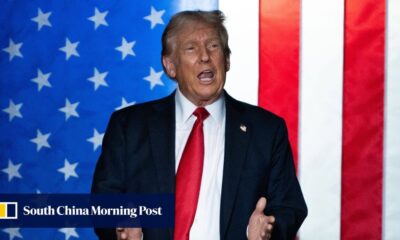Regulation
Lancement des ETF Bitcoin (BTC) et Ether (ETH) mardi à Hong Kong : entretien avec des dirigeants clés

En plus du capital d’amorçage plus élevé, Zhu Haokang a également pris note de la disponibilité de souscriptions et de rachats en nature ainsi que de la clarté réglementaire à Hong Kong qui autorisait un ETF spot éther avant qu’il ne soit disponible aux États-Unis. Participant également au briefing était Wayne Huang, responsable de l’ETF et dépositaire de l’échange cryptographique OSL.
Que pense China Asset Management (Hong Kong) de l’ampleur des entrées de capitaux le premier jour de cotation des ETF de crypto-monnaie de Hong Kong demain ?
Zhu Haokang : Je suis convaincu que l’échelle de cotation initiale de l’ETF au comptant d’actifs virtuels de Hong Kong (plus de 125 millions de dollars américains) peut dépasser l’échelle d’émission le premier jour des États-Unis. L’échelle d’émission des 10 émetteurs américains d’ETF au comptant Bitcoin le premier jour du 10 janvier de cette année était de 125 millions de dollars. Huaxia est convaincue qu’elle deviendra le plus grand émetteur d’ETF parmi les trois émetteurs. Les détails seront dévoilés à tous à 9h30 demain matin.
Wayne Huang : Il y aura une annonce de la Bourse de Hong Kong demain matin à 9h30, mais OSL a bel et bien bouclé aujourd’hui sa première journée de levée de fonds sur OSL avec deux fonds (dont Huaxia et un autre fonds qui coopère avec nous). À en juger par les chiffres, les transactions sont en effet bien supérieures à l’afflux de capitaux de l’ETF au comptant américain Bitcoin lors de son premier jour de négociation.
Quelle est la différence entre l’ETF Spot China Bitcoin et l’ETF Spot China Ethereum et les autres ETF ?
Zhu Haokang : La première différence est que par rapport à l’ETF US spot Bitcoin, nous avons des souscriptions et des rachats au comptant et physiques, ce que l’ETF US spot Bitcoin n’a pas.
En outre, il existe deux différences entre les produits de ChinaAMC et les deux autres : l’ETF au comptant de Hong Kong de ChinaAMC est le seul ETF doté de compteurs en dollars de Hong Kong, en dollars américains et en RMB. La seconde est qu’en plus des actions cotées, nous avons des actions non cotées. Ces deux points ne sont pas disponibles dans les deux autres sociétés.
En plus de Hong Kong, où d’autres investisseurs ont-ils participé à l’ETF au comptant d’actifs virtuels de Hong Kong ?
Zhu Haokang : Grâce à la méthode de souscription physique, les investisseurs incluent tout d’abord les mines Bitcoin, etc. Ils peuvent utiliser leurs avoirs Bitcoin pour acheter directement des ETF spot d’actifs virtuels à Hong Kong. Deuxièmement, dans les pays et régions qui n’ont pas encore émis d’ETF en dehors de Hong Kong, comme Singapour et le Moyen-Orient, nous avons également été en contact avec un grand nombre d’investisseurs extrêmement intéressés. De plus, bien que le marché au comptant actuel des ETF Bitcoin aux États-Unis soit très vaste par rapport aux États-Unis, Hong Kong utilise des abonnements en espèces et physiques et est ouvert à la négociation pendant les heures de négociation asiatiques, ce qui attirera toujours de nombreux investisseurs américains. Enfin, plusieurs family offices en Asie et à l’étranger sont également très intéressés par les ETF crypto spot.
Existe-t-il actuellement une seule maison de titres, Victory Securities, qualifiée pour réaliser les opérations pertinentes de souscription physique ?
Wayne Huang : Non seulement Victory Securities peut effectuer des souscriptions physiques, mais également Huaying Securities avec le soutien d’OSL. Actuellement, trois sociétés de titres peuvent procéder à des souscriptions physiques, et un suivi plus approfondi sera effectué ultérieurement. Par conséquent, après la cotation de l’ETF demain, de nombreux courtiers suivront, et il est possible que davantage de courtiers participent à l’ensemble de l’écosystème des ETF d’actifs virtuels en mai.
Quelles sont les opérations spécifiques à l’achat physique ?
Wayne Huang : La souscription physique est une initiative pionnière pour les ETF hongkongais et différente des ETF américains. Premièrement, la société de courtage doit mettre à niveau sa licence n°1 pour pouvoir gérer les transactions d’actifs virtuels. Les investisseurs peuvent transférer leurs pièces vers OSL via cette société de courtage, puis enfin retransférer leurs capitaux propres vers OSL. Transférez-le sur le compte-titres du fonds et finalisez l’ensemble du processus de souscription physique.
Quel est le processus anti-blanchiment d’OSL en abonnement physique ? Est-il acceptable que la contrepartie soit le portefeuille de l’autre bourse ?
Wayne Huang : Premièrement, les investisseurs doivent se connecter à OSL via une société de courtage pour ouvrir un compte. Nous effectuerons une vérification de la liste blanche du portefeuille sur le point de transférer de l’argent pour prouver que ce portefeuille est détenu et contrôlé par l’investisseur. Deuxièmement, nous vérifierons l’investissement. Le portefeuille privé de l’utilisateur doit être examiné pour voir s’il y a des transactions suspectes dans les dizaines de transactions passées du portefeuille sur la chaîne. Seuls les portefeuilles ayant réussi la vérification de la liste blanche peuvent lui permettre de transférer de l’argent.
Un portefeuille peut-il être le portefeuille d’un autre échange ? En théorie, cela peut être fait. Si les règles anti-blanchiment d’argent de l’autre bourse sont conformes aux règles OSL, nous pouvons accepter le transfert de pièces de monnaie de l’autre partie, mais nous avons besoin que l’autre bourse fournisse certaines informations sur les clients.
Les ETF au comptant de crypto-monnaie de Hong Kong peuvent-ils être ouverts aux investisseurs du continent ? Ou y aura-t-il une possibilité de l’ouvrir à l’avenir aux investisseurs du continent ?
Zhu Haokang : Actuellement, les investisseurs de Chine continentale ne sont pas autorisés à investir dans les ETF au comptant de crypto-monnaie de Hong Kong. Les investisseurs qualifiés, les investisseurs institutionnels, les investisseurs particuliers et les investisseurs internationaux de Hong Kong qui respectent la réglementation peuvent tous investir dans des ETF au comptant de crypto-monnaie. Pour plus de détails, vous pouvez consulter les courtiers et les canaux de vente, et continuer à vérifier s’il y aura des ajustements réglementaires correspondants ou l’introduction d’un cadre réglementaire spécifique à l’avenir.
L’ETF au comptant Ethereum de Hong Kong est le premier au monde, mais si les États-Unis déterminent finalement que « Ethereum » est un titre, cela affectera-t-il l’ETF au comptant Ethereum de Hong Kong ?
Wayne Huang : Probablement pas, car le fait que les États-Unis définissent Ethereum comme un titre n’affecte pas la prise de décision indépendante de la Commission de réglementation des valeurs mobilières de Hong Kong. La Commission de réglementation des valeurs mobilières de Hong Kong dispose de son propre ensemble de procédures pour déterminer si un certain actif virtuel est un titre et s’il peut être ouvert aux commerçants de détail. Il ne sera pas affecté par les opinions divergentes des différents départements des États-Unis, ni par leur propre définition unilatérale. à Hong Kong.
Je tiens également à souligner pourquoi Hong Kong peut être le premier au monde à lancer un ETF spot Ethereum, plutôt que les États-Unis ? Aux États-Unis, plusieurs départements s’expriment en même temps ou tentent de réglementer la réglementation de la crypto-monnaie. Qui devrait superviser les crypto-monnaies à Hong Kong a été décidé depuis longtemps, à savoir la Commission chinoise de réglementation des valeurs mobilières. La Commission chinoise de réglementation des valeurs mobilières a défini des cadres réglementaires très clairs. Hong Kong a déjà eu une définition claire d’Ethereum. Ethereum Ce n’est pas un titre, mais le premier actif virtuel non-titres à être inclus dans la surveillance de Hong Kong avec Bitcoin, et c’est l’une des deux cibles qui peuvent être fournies aux investisseurs particuliers.
Hong Kong lancera-t-elle d’autres ETF d’actifs virtuels ?
Wayne Huang : Uniquement Bitcoin et Ethereum pour l’instant. Nous avons discuté à plusieurs reprises avec la Commission chinoise de réglementation des valeurs mobilières du processus d’inscription des pièces dans les transactions de conformité à Hong Kong. Permettez-moi de partager brièvement. Premièrement, nous avons besoin que l’émetteur de l’actif virtuel ou nous-mêmes obtenions un avis juridique indiquant si la pièce est un titre ou non. Et transformez l’avis juridique et notre diligence raisonnable sur la monnaie en un rapport de recherche détaillé et soumettez-le à la Commission chinoise de réglementation des valeurs mobilières. Après l’approbation finale de la Commission chinoise de réglementation des valeurs mobilières, il sera d’abord ouvert aux investisseurs professionnels. Lorsqu’un certain niveau de liquidité est atteint, celle-ci sera incluse. Après une période de temps dans le cadre d’un indice, nous pouvons demander à la Securities Regulatory Commission de mettre à niveau la devise devant être négociée par les investisseurs particuliers.
Mais jusqu’à présent, après 4 ans d’activité, OSL ne dispose toujours que de deux actifs, Bitcoin et Ethereum, ouverts aux investisseurs particuliers pour le trading. C’est-à-dire que pour l’heure, seules ces deux pièces remplissent les conditions de lancement des ETF. , mais nous avons discuté et étudié avec la Commission chinoise de réglementation des valeurs mobilières.
Envisagerez-vous de lancer des ETF tels que l’effet de levier inverse des actifs virtuels ?
Zhu Haokang : L’ETF lui-même regorge d’attributs financiers, qui impliquent l’innovation de nombreux produits financiers. Nous avons également vu certaines banques d’investissement internationales innover dans le domaine financier et développer des produits dérivés similaires sur des produits américains existants. Nous accordons également une attention particulière et communiquons avec un grand nombre de banques d’investissement et de sociétés de titres. Pour donner un exemple simple, la Bourse de Hong Kong autorise également les ETF à vendre à découvert et même à négocier sur marge. Nous communiquons également avec nos partenaires pour créer plus de revenus et plus d’innovation dans les produits financiers pour nos investisseurs ETF. .
Comment pensez-vous que le prochain ETF de crypto-monnaie affectera le prix de la crypto-monnaie ?
Zhu Haokang : Sur la base de l’analyse de divers facteurs, nous pensons que les ETF de crypto-monnaies seront bénéfiques pour les prix des crypto-monnaies. Premièrement, le marché des ETF crypto au comptant de Hong Kong injecte plus de liquidités dans le marché de la cryptographie. Deuxièmement, accélérer la mise en conformité de l’industrie. Troisièmement, les canaux de financement ont été élargis. Quatrièmement, les investisseurs peuvent obtenir des opportunités d’arbitrage entre les prix des ETF et les prix au comptant, permettant ainsi à davantage de teneurs de marché et d’investisseurs en arbitrage de participer activement. Cinquièmement, avec l’adoption de notre ETF crypto spot, les facteurs de négociation sur les marchés traditionnels affecteront également directement le marché des cryptomonnaies. Sixième point, nous pensons que le cadre réglementaire de Hong Kong est relativement clair et que l’émission de produits ETF Bitcoin et Ethereum offre une grande commodité. Septième point, nous pensons que Hong Kong, en tant que centre financier international, attirera davantage d’investisseurs chinois pour négocier pendant les périodes asiatiques, améliorera la liquidité du marché et obtiendra de meilleurs résultats que des produits similaires en Europe ou au Canada.
Les tarifs de Huaxia sont plus élevés que ceux des deux autres sociétés de Hong Kong. Craignez-vous le manque de compétitivité ?
Zhu Haokang : Je pense que tout le monde est plus préoccupé par la question des frais. Tout d’abord, la structure tarifaire de China Asset Management Hong Kong suit pleinement les normes des ETF thématiques et complexes cotés à Hong Kong. Vous pouvez vous référer aux crypto-monnaies cotées dans le passé, aux ETF à terme et à divers ETF thématiques. Des charges. Nos tarifs sont inférieurs aux tarifs similaires. Deuxièmement, nos produits offrent une très grande flexibilité dans les options de négociation, prenant non seulement en charge les actions cotées et non cotées, mais prenant également en charge trois types de transactions de gré à gré en dollars américains, en dollars de Hong Kong et en RMB. C’est notre avantage unique. Troisièmement, la complexité et l’innovation de nos produits déterminent l’importance de notre gestion des risques et de notre stabilité opérationnelle.
Regulation
Crypto community gets involved in anti-government protests in Nigeria

Amid the #EndBadGovernanceInNigeria protests in Nigeria, a notable shift is occurring within the country’s cryptocurrency sector. As the general public demands sweeping governance reforms, crypto community leaders are seizing the opportunity to advocate for specific regulatory changes.
Rume Ophi, former secretary of the Blockchain Stakeholders Association of Nigeria (SiBAN), stressed the critical need to integrate crypto-focused demands into the broader agenda of the protests.
Ophi explained the dual benefit of such requirements, noting that proper regulation can spur substantial economic growth by attracting investors and creating job opportunities. Ophi noted, “Including calls for favorable crypto regulations is not just about the crypto community; it’s about leveraging these technologies to foster broader economic prosperity.”
Existing government efforts
In opposition to Ophi’s call for action, Chimezie Chuta, chair of the National Blockchain Policy Steering Committee, presents a different view. He pointed out The Nigerian government continued efforts to nurture the blockchain and cryptocurrency industries.
According to Chuta, the creation of a steering committee was essential to effectively address the needs of the crypto community.
Chuta also highlighted the creation of a subcommittee to harmonize regulations for virtual asset service providers (VASPs). With the aim of streamlining operations and providing clear regulatory direction, the initiative involves cooperation with major organizations including the Securities and Exchange Commission (SEC) and the Central Bank of Nigeria (CBN). “Our efforts should mitigate the need for protest as substantial progress is being made to address the needs of the crypto industry,” Chuta said.
A united call for support
The ongoing dialogue between the crypto community and government agencies reflects a complex landscape of negotiations and demands for progress.
While actors like Ophi are calling for more direct action and the inclusion of crypto demands in protest agendas, government figures like Chuta are advocating for recognition of the steps already taken.
As protests continue, the crypto community’s push for regulatory reform highlights a crucial aspect of Nigeria’s broader fight to improve governance and economic policies. Both sides agree that favorable regulations are critical to the successful adoption and implementation of blockchain technologies, signaling a potentially transformative era for Nigeria’s economic framework.
Read also : OKX Exchange Exits Nigerian Market Amid Regulatory Crackdown
Regulation
Cryptocurrency Regulations in Slovenia 2024

Slovenia, a small but highly developed European country with a population of 2.1 million, boasts a rich industrial history that has contributed greatly to its strong economy. As the most economically developed Slavic nation, Slovenia has grown steadily since adopting the euro in 2007. Its openness to innovation has been a key factor in its success in the industrial sector, making it a prime destination for cryptocurrency enthusiasts. Many believe that Slovenia is poised to become a powerful fintech hub in Europe. But does its current regulatory framework for cryptocurrencies support such aspirations?
Let’s explore Slovenia’s cryptocurrency regulations and see if they can propel the country to the forefront of the cryptocurrency landscape. My expectations are positive. What are yours? Before we answer, let’s dig a little deeper.
1. Cryptocurrency regulation in Slovenia: an overview
Slovenia is renowned for its innovation-friendly stance, providing a supportive environment for emerging technologies such as blockchain and cryptocurrencies. Under the Payment Services and Systems Act, cryptocurrencies are classified as virtual assets rather than financial or monetary instruments.
The regulation of the cryptocurrency sector in Slovenia is decentralized. Different authorities manage different aspects of the ecosystem. For example, the Bank of Slovenia and the Securities Market Agency oversee cryptocurrency transactions to ensure compliance with financial laws, including anti-money laundering (AML) and terrorist financing regulations. The Slovenian Act on the Prevention of Money Laundering and Terrorist Financing (ZPPDFT-2) incorporates the EU’s 5th Anti-Money Laundering Directive (5MLD) and aligns with the latest FATF recommendations. All virtual currency service providers must register with the Office of the Republic of Slovenia.
2. Cryptocurrency regulation in Slovenia: what’s new?
Several notable developments have taken place this year in the cryptocurrency sector in Slovenia:
July 25, 2024:Slovenia has issued a €30 million on-chain digital sovereign bond, the first of its kind in the EU, with a yield of 3.65%, maturing on 25 November 2024.
May 14, 2024:NiceHash has announced the first Slovenian Bitcoin-focused conference, NiceHashX, scheduled for November 8-9 in Maribor.
3. Explanation of the tax framework for cryptocurrencies in Slovenia
The Slovenian cryptocurrency tax framework provides clear guidelines for individuals and businesses. According to the Slovenian Financial Administration, the tax treatment depends on the status of the trader and the nature of the transaction.
- People:Income earned from cryptocurrencies through employment or ongoing business activities is subject to personal income tax. However, capital gains from transactions or market fluctuations are exempt from tax.
- Companies:Capital gains from cryptocurrency-related activities are subject to a 19% corporate tax. Value-added tax (VAT) generally applies at a rate of 22%, although cryptocurrency transactions that are considered as means of payment are exempt from VAT. Companies are not allowed to limit payment methods to cryptocurrencies alone. Tokens issued during ICOs must follow standard accounting rules and corporate tax law.
4. Cryptocurrency Mining in Slovenia: What You Need to Know
Cryptocurrency mining is not restricted in Slovenia, but income from mining is considered business income and is therefore taxable. This includes rewards from validating transactions and any additional income from mining operations. Both individuals and legal entities must comply with Slovenian tax regulations.
5. Timeline of the development of cryptocurrency regulation in Slovenia
Here is a timeline highlighting the evolution of cryptocurrency regulations in Slovenia:
- 2013:The Slovenian Financial Administration has issued guidelines stating that income from cryptocurrency transactions should be taxed.
- 2017:The Slovenian Financial Administration has provided more detailed guidelines on cryptocurrency taxation, depending on factors such as the status of the trader and the type of transaction.
- 2023:The EU adopted the Markets in Crypto-Assets (MiCA) Regulation, establishing a uniform regulatory framework for crypto-assets, their issuers and service providers across the EU.
Endnote
Slovenia’s approach to the cryptocurrency sector is commendable, reflecting its optimistic view of the future of cryptocurrencies. The country’s balanced regulatory framework supports cryptocurrency innovation while protecting users’ rights and preventing illegal activities. Recent developments demonstrate Slovenia’s commitment to continually improving its regulatory environment. Slovenia’s cryptocurrency regulatory framework sets a positive example for other nations navigating the evolving cryptocurrency landscape.
Read also : Hong Kong Cryptocurrency Regulations 2024
Regulation
A Blank Sheet for Cryptocurrencies: Kamala Harris’ Regulatory Opportunity

photo by Shubham Dhage on Unsplash
As the cryptocurrency landscape continues to evolve, the need for clear regulation has never been more pressing.
With Vice President Kamala Harris now leading the charge on digital asset regulation in the United States, this represents a unique opportunity to start fresh. This fresh start can foster innovation and protect consumers. It can also pave the way for widespread adoption across industries, including real estate agencies, healthcare providers, and online gaming platforms like these. online casinos ukAccording to experts at SafestCasinoSites, these platforms come with benefits such as bonus offers, a wide selection of games, and various payment methods. Ultimately, all this increase in adoption could propel the cryptocurrency market forward.
With this in mind, let’s look at the current state of cryptocurrency regulation in the United States, a complex and confusing landscape. Multiple agencies, including the Securities and Exchange Commission (SEC), the Commodity Futures Trading Commission (CFTC), and the Financial Crimes Enforcement Network (FinCEN), have overlapping jurisdictions, creating a fragmented regulatory environment. This lack of clarity has stifled innovation as companies are reluctant to invest in the United States, fearing regulatory repercussions. A coherent and clear regulatory framework is urgently needed to realize the full potential of cryptocurrencies in the United States.
While the US struggles to find its footing, other countries, such as Singapore and the UK, are actively looking into the cryptocurrency sector by adopting clear and supportive regulatory frameworks. This has led to a brain drain, with companies choosing to locate in more conducive environments.
Vice President Kamala Harris has a unique opportunity to change that narrative and start over. Regulation of cryptocurrencies. By taking a comprehensive and inclusive approach, it can help create a framework that balances consumer protection with innovation and growth. The time has come for clear and effective regulation of cryptocurrencies in the United States.
Effective regulation of digital assets is essential to foster a safe and innovative environment. The key principles guiding this regulation are clarity, innovation, global cooperation, consumer protection, and flexibility. Clear definitions and guidelines eliminate ambiguity while encouraging experimentation and development to ensure progress. Collaboration with international partners establishes consistent standards, preventing regulatory arbitrage. Strong safeguards protect consumers from fraud and market abuse, and adaptability allows for evolution in response to emerging trends and technologies, striking a balance between innovation and protection.
The benefits of effective cryptocurrency regulation are multiple and far-reaching. By establishing clear guidelines, governments can attract investors and mainstream users, driving growth and adoption. This can, in turn, position countries like the United States as global leaders in fintech and innovation. Strong safeguards will also increase consumer confidence in digital assets and related products, increasing economic activity.
A thriving crypto industry can contribute significantly to GDP and job creation, which has a positive impact on the overall economy. Furthermore, effective regulation has paved the way for the growth of many businesses such as tech startups, online casinos, and pharmaceutical companies, demonstrating that clear guidelines can open up new opportunities without stifling innovation. This is a great example of how regulation can allay fears of regressive policies, even if Kamala Harris does not repeal the current progressive approach. By adopting effective regulation, governments can create fertile ground for the crypto industry to thrive, thereby promoting progress and prosperity.
Regulation
South Korea Imposes New ‘Monitoring’ Fees on Cryptocurrency Exchanges

Big news! The latest regulatory changes in South Korea are expected to impact major cryptocurrency exchanges like Upbit and Bithumb. Under the updated regulations, these platforms will now have to pay monitoring fees, which could cause problems for some exchanges.
Overview of new fees
In the latest move to regulate cryptocurrencies, the Financial Services Commission announced on July 1 the revised “Enforcement Order of the Act on the Establishment of the Financial Services Commission, etc.” update “Regulations on the collection of contributions from financial institutions, etc.” According to local legislation newsThe regulations require virtual asset operators to pay supervisory fees for inspections conducted by the Financial Supervisory Service starting next year. The total fees for the four major exchanges are estimated at around 300 million won, or about $220,000.
Apportionment of costs
Upbit, which holds a dominant market share, is expected to bear more than 90% of the total fee, or about 272 million won ($199,592) based on its operating revenue. Bithumb will pay about 21.14 million won ($155,157), while Coinone and GOPAX will contribute about 6.03 million won ($4,422) and 830,000 won ($608), respectively. Korbit is excluded from this fee due to its lower operating revenue.
Impact on the industry
The supervision fee will function similarly to a quasi-tax for financial institutions subject to inspections by the Financial Supervisory Service. The new law requires any company with a turnover of 3 billion won or more to pay the fee.
In the past, fees for electronic financial companies and P2P investment firms were phased in over three years. However, the taxation of virtual asset operators has been accelerated, reflecting the rapid growth of the cryptocurrency market and increasing regulatory scrutiny.
Industry reactions
The rapid introduction of the fee was unexpected by some industry players, who had expected a delay. Financial Supervisory Service officials justified the decision by citing the creation of the body concerned and the costs already incurred.
While larger exchanges like Upbit and Bithumb can afford the cost, smaller exchanges like Coinone and GOPAX, which are currently operating at a loss, could face an additional financial burden. This is part of a broader trend of declining trading volumes for South Korean exchanges, which have seen a 30% drop since the new law went into effect.
-

 Regulation12 months ago
Regulation12 months agoRipple CTO and Cardano founder clash over XRP’s regulatory challenges ⋆ ZyCrypto
-

 Regulation10 months ago
Regulation10 months agoNancy Pelosi Considers Supporting Republican Crypto Bill FIT21 – London Business News
-

 Videos11 months ago
Videos11 months agoCryptocurrency News: Bitcoin, ETH ETF, AI Crypto Rally, AKT, TON & MORE!!
-

 Regulation11 months ago
Regulation11 months agoBitcoin’s future is ‘bleak’ and ripe for regulation, says lead developer
-

 News8 months ago
News8 months agoAave Price Increases Following Whales Accumulation and V3.1 Launch
-

 Regulation8 months ago
Regulation8 months agoSouth Korea Imposes New ‘Monitoring’ Fees on Cryptocurrency Exchanges
-

 Regulation8 months ago
Regulation8 months agoA Blank Sheet for Cryptocurrencies: Kamala Harris’ Regulatory Opportunity
-

 Regulation8 months ago
Regulation8 months agoCryptocurrency Regulations in Slovenia 2024
-

 News11 months ago
News11 months agoThe trader earned $46 million with PEPE after reaching a new ATH
-

 Regulation11 months ago
Regulation11 months agoCrypto needs regulation to thrive: Tyler Cowen
-

 Blockchain11 months ago
Blockchain11 months agoSolana ranks the fastest blockchain in the world, surpassing Ethereum, Polygon ⋆ ZyCrypto
-

 Blockchain11 months ago
Blockchain11 months agoSolana Surpasses Ethereum and Polygon as the Fastest Blockchain ⋆ ZyCrypto

















